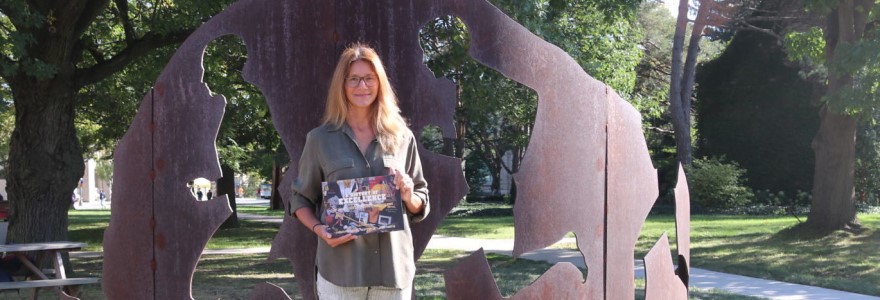News and Updates
Contact
Faculty of Social Science
Social Science Centre
Room 9438
Western University
T. 519-661-2053
F. 519-661-3868
E. social-science@uwo.ca
Telling the untold story of Indigenous athletes
October 01, 2021
Story and photo by Keri Ferguson, Western Communications
When she found it on her doorstep and saw her name printed on the cover of a book she collaborated on over the past year, Janice Forsyth couldn’t believe her eyes.
“That acknowledgement from the community was so meaningful, it almost made me cry,” said Forsyth, associate professor of sociology and director of Indigenous Studies at Western.
Being acknowledged is the larger idea behind A History of Excellence, The Untold Stories of Manitoba’s Indigenous Sport. The book celebrates more than 100 Indigenous athletes from Manitoba, “but it’s more than that,” Forsyth said. “It’s an authentic response by Indigenous Peoples to the Truth and Reconciliation Call to Action 87,” which is “to provide public education that tells the national story of Aboriginal athletes in history.”
“I was just so touched, because a lot of the work we do as Indigenous scholars is invisible and difficult to count as work on our CV. It was such a different way from how we are usually acknowledged.”
Call to action
Typically, sports organizations and public institutions don’t have the human resources and capacity to tell the actual stories of Indigenous athletes, Forsyth said. Instead, they take existing narratives and repackage them, “telling the same story over and over.”
“That’s what makes this book so significant,” she said. “It’s the first Indigenous-led response to that particular call to action – working with people at a community level trying to tell their own stories. It’s just very different from what mainstream organizations are doing, and far more robust.”
The book is published by the Manitoba Sports and Recreation Council (MASRC), which aimed to do something meaningful despite the pandemic restrictions. The organization channeled the time and resources usually spent on ‘sport on the ground’ toward producing the book.
Forsyth, BA’95, MA’00, PhD’05, provided historical context and practical guidance on publishing issues, collaborating with co-authors Carreira Lamoureux, sport for social development manager at MASRC, and Scott Taylor, a sports reporter in Manitoba. And although she underplays her role, Forsyth’s contribution to the book was an “incredible honour,” said Melanie Whitesell, executive director of MASRC.
“Janice is known worldwide for her expertise in Indigenous sport. Her knowledge on the Tom Longboat awards and sport and residential schools allowed stories that have not been widely shared to be included as eloquent additions to our book,” Whitesell said.
Forsyth is vice-president of Aboriginal Sport Circle, a not-for-profit organization that supports the health and well-being of Indigenous Peoples and communities through participation in sport, physical activity and recreation.
She’s also the author of Reclaiming Tom Longboat: Indigenous Self-Determination in Canadian Sport, which explores the story of a more widely known Indigenous athlete, who had little say in the narrative surrounding his life in sport.
It’s part of an overall complexity many Indigenous athletes have faced throughout history.
A league of her own
One story from the book stands out for Forsyth as a hopeful sign more Indigenous sports stories are coming to light.
It centers on Yolande “Yo-Yo” Teillet Schick, a Métis catcher who played with the All-American Girls Baseball League, the inspiration for the film, A League of their Own.
“I had no idea one of the women on that team was Indigenous and I used to teach about the all-American girls’ team in Canadian sport history when I was in Western’s kinesiology department,” Forsyth said. “We looked at gender codes, and how the women were expected to behave and dress to be on the team, but I didn’t know there were any racialized athletes on those teams.”
With many more stories waiting to be told, Forsyth said MASRC, and her co-authors are already excited by the possibilities of follow-up books – from Indigenous NHL and elite level hockey players, to the structure and benefits of Indigenous community hockey and the North American Indigenous Games.
“Those are just obvious entry points,” Forsyth said. “There are so many more stories of Indigenous athletes that have been left out, unattended to by mainstream sport journalists and organizations.
“We are barely scratching the surface of the breadth and depth of these athletes. This should really show the government and Manitoban and Canadian sport organizations there’s still a lot of work to do, in supporting Indigenous sport.”
***
A History of Excellence, The Untold Stories of Manitoba’s Indigenous Sport can be purchased by contacting the MASRC.

